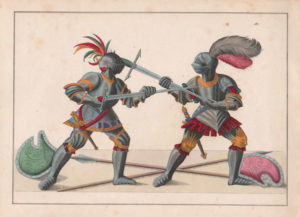 How do you build muscle? Your muscles get challenged by the weight you lift. In overcoming that challenge, those muscles get stronger. As a person trying to get in better physical condition, you must steadily increase the weight in order to maintain the challenge. Once you stop increasing the challenge, your muscles stop growing. Our fallen human nature is similar. The need to work in order to earn money for food, shelter, and entertainment is a challenge that keeps us from lying on the couch all day long. Giving people all of their basic needs without requiring their participation rarely results in amazing higher-level achievements – what it tends to do is make people less inclined to do anything. We can see Jesus using this aspect of human nature in the miracle of the multiplication of the loaves and fishes. As God, Jesus could have simply created food out of rock, or sand, or nothing at all. But He asked the people there to participate in the miracle, because He knows that we need to participate in some small way. The best way to motivate people to achieve more in business is by giving them a way to increase past the point of basics through additional work. We can also see this pattern in relationships. Pre-marital intimacy does not lead to quicker and stronger marriages. Instead, it most typically leads to extended dating scenarios with the man avoiding a traditional commitment to the woman. But with the challenge of commitment, a man typically decides quickly if he loves a woman enough to permanently link their lives and souls. The challenge presented brings out the champion in each of us.
How do you build muscle? Your muscles get challenged by the weight you lift. In overcoming that challenge, those muscles get stronger. As a person trying to get in better physical condition, you must steadily increase the weight in order to maintain the challenge. Once you stop increasing the challenge, your muscles stop growing. Our fallen human nature is similar. The need to work in order to earn money for food, shelter, and entertainment is a challenge that keeps us from lying on the couch all day long. Giving people all of their basic needs without requiring their participation rarely results in amazing higher-level achievements – what it tends to do is make people less inclined to do anything. We can see Jesus using this aspect of human nature in the miracle of the multiplication of the loaves and fishes. As God, Jesus could have simply created food out of rock, or sand, or nothing at all. But He asked the people there to participate in the miracle, because He knows that we need to participate in some small way. The best way to motivate people to achieve more in business is by giving them a way to increase past the point of basics through additional work. We can also see this pattern in relationships. Pre-marital intimacy does not lead to quicker and stronger marriages. Instead, it most typically leads to extended dating scenarios with the man avoiding a traditional commitment to the woman. But with the challenge of commitment, a man typically decides quickly if he loves a woman enough to permanently link their lives and souls. The challenge presented brings out the champion in each of us.
In human history there has always been both challenges to excel as well as the challenge provided by adversity. Getting the basics of life for yourself and your family was a true challenge. As part of  the Christian worldview, we began to reduce the chances for life-threatening adversity and this resulted in a much better society overall. We cured more sicknesses, fed more people, and lowered infant mortality which helped to make the bare essential parts of life possible for a great number of people. The challenges then became advancing from subsistence to abundance. It can be argued that in modern society we are now providing more than subsistence and have encroached into satisfactory. While no one would argue that welfare is abundance, the level it does provide along with the way it is structured makes it easier just to stay at that level instead of becoming self-sufficient. Without that challenge of needing to lead and provide for a family, we have made couch potatoes. The Catholic Church, likewise, has responded to the reduction of challenges in our society by making it easier – the fast before receiving Holy Communion has been reduced to a bare minimum, Holy Days of Obligation are moved to Sunday so people don’t have to go Mass more than once per week, penance on Fridays has been downplayed until it has been all but obliterated, and the examples could go on. The central idea was that in making it easier to be Catholic, more people would choose to be in the faith. However, the reality is something quite different. Without the challenges presented by trying to live the traditional faith, people became spiritual couch potatoes. Jesus, who knows a thing or two about human nature, put out some amazing challenges for the faithful:
the Christian worldview, we began to reduce the chances for life-threatening adversity and this resulted in a much better society overall. We cured more sicknesses, fed more people, and lowered infant mortality which helped to make the bare essential parts of life possible for a great number of people. The challenges then became advancing from subsistence to abundance. It can be argued that in modern society we are now providing more than subsistence and have encroached into satisfactory. While no one would argue that welfare is abundance, the level it does provide along with the way it is structured makes it easier just to stay at that level instead of becoming self-sufficient. Without that challenge of needing to lead and provide for a family, we have made couch potatoes. The Catholic Church, likewise, has responded to the reduction of challenges in our society by making it easier – the fast before receiving Holy Communion has been reduced to a bare minimum, Holy Days of Obligation are moved to Sunday so people don’t have to go Mass more than once per week, penance on Fridays has been downplayed until it has been all but obliterated, and the examples could go on. The central idea was that in making it easier to be Catholic, more people would choose to be in the faith. However, the reality is something quite different. Without the challenges presented by trying to live the traditional faith, people became spiritual couch potatoes. Jesus, who knows a thing or two about human nature, put out some amazing challenges for the faithful:
- “But I say to you that every one who looks at a woman lustfully has already committed adultery with her in his heart.” Matthew 5:28
- “But I say to you that every one who is angry with his brother shall be liable to judgment” Matthew 5:22
- “But I say to you that every one who divorces his wife, except on the ground of unchastity, makes her an adulteress; and whoever marries a divorced woman commits adultery.” Matthew 5:32
- “But I say to you that hear, Love your enemies, do good to those who hate you, bless those who curse you, pray for those who abuse you.” Luke 6:27-28
These sayings of Jesus present believers with a challenge that would be impossible under normal human conditions. As God, He knows this; however, instead of relaxing the teaching and reducing the challenge, Jesus gives us the Sacrament of Reconciliation to help us receive the Grace of God and continually improve ourselves. By keeping the bar set high, believers are constantly challenged to live better and grow closer to God’s design for humanity before the fall.
Without challenges, our fallen human nature often causes us to sink to a low. In Proverbs 27:17, Solomon writes that “Iron sharpens iron, and one man sharpens another.” A sword is sharpened by using an iron file – the resistance, or challenge, of the iron file against the blade creates the sharp edge. Further, Zechariah talks about refining silver and testing gold in chapter 13 verse 9 as a metaphor to the tests that God will put people through. The challenge presented by this text is there to motivate us to do everything we can to avoid despair and to persevere. We must not run away or hide from the challenges we are presented with. In this apostolate, the Order of Lepanto, we present members with the challenge of learning the martial arts used by Medieval and Renaissance Knights (sword, shield, dagger, and unarmed defense skills) while also praying and studying the faith. If you are not getting good external challenges, you should consider creating your own. Make them hard, but achievable, and be honest with yourself about how you are doing. Forgive yourself when you mess up, but commit to trying harder the next day and never give up trying to improve. Some of the things you can do:
- Daily spiritual reading and reflection
- Daily prayer
- Join a men’s group
- Nurture fellowship & friendship with men who have similar goals
- Fast on Fridays
- Attend Mass on a Holy Day, even if it has been moved to the nearest Sunday
- Cut out a habit that gets in the way of your vocation
If you give yourself good, holy challenges then you will improve your chances of being a spiritual champion – which we know by another name: Saint.
Facebook Comments